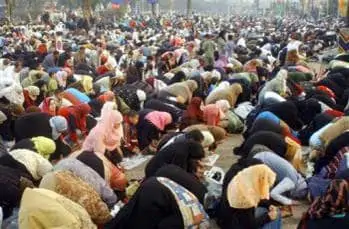Hafsa h said: “We used to prevent prepubescent girls from attending Eid prayers. Then a woman came and stayed at the fort of Banu Khalaf, and told us about her sister. Her sister’s husband had taken part in twelve campaigns with the Prophet (peace and blessings of Allaah be upon him) and [she said], ‘my sister was with him on six of them. She said, “We used to treat the wounded and take care of the sick. My sister asked the Prophet (peace and blessings of Allaah be upon him) whether there was anything wrong with her not going out [on Eid] if she did not have a jilbaab. He said, ‘Let her friend give her one of her jilbaabs so that she may witness the blessings of Eid and see the Muslims gathering.’”’ When Um ‘Atiyah came, I asked her, ‘Did you hear the Prophet (peace and blessings of Allaah be upon him) [say this]?’ She said, ‘May my father be sacrificed for him’ – and she never mentioned him without saying ‘may my father be sacrificed for him’ – ‘I heard him saying that we should bring out the young girls and those who were secluded, or the young girls who were secluded, and the menstruating women, so that they could witness the blessings of Eid and see the gathering of the believers, but those who were menstruating were to keep away from the prayer-place itself.”
(Saheeh al-Bukhaari, 324).
The ‘young girls’ (‘awaatiq, sing. ‘aatiq) are girls who have reached adolescence or are close to it, or have reached the age of marriage, or are very precious to their families, or who are spared from having to do humiliating work. It appears that they used to prevent these young girls from going out because of the corruption that arose after the first generation of Islam; but the Sahaabah did not approve of that and they thought that the ruling should remain in their time as it had been during the time of the Prophet (peace and blessings of Allaah be upon him).
Where it says “My sister was with him” it seems that there is something omitted, probably “the woman said”. [This is reflected in the translation above. Translator].…
“Her jilbaabs” – she should lend her some of her clothes that she does not need.
“Secluded” – they would have a curtain in the corner of the house behind which virgins would stay.
“Menstruating women” – huyyad, sing. haa’id – this may refer either to girls who have reached the age of puberty, or women who are having their period and are not taahir (pure).
“Menstruating women should avoid the prayer-place itself” – Ibn al-Munayyir said: “The reason why they should avoid the prayer-place is that if they stand with the women who are praying even though they are not praying, it may appear that they have no respect for the prayer or are careless, so it better for them to avoid that.”
It was said that the reason why menstruating women should avoid the prayer-place is as a precaution, so that women will not come near men for no reason if they are not praying, or so that they will not offend others with their blood or their odour.
The hadeeth urges everyone to attend Eid prayer, and to co-operate with one another in righteousness and piety. The menstruating woman should not forsake the remembrance of Allaah or places of goodness such as gatherings for the purpose of seeking knowledge and remembering Allaah – apart from mosques. The hadeeth also indicates that women should not go out without a jilbaab.
This hadeeth tells us that it is not proper for young women and women in seclusion to go out except for a valid reason. It states that it is preferable (mustahabb) for a woman to wear a jilbaab, and that it is permissible to lend and borrow clothes. It also indicates that Eid prayer is obligatory (waajib).
Ibn Abi Shaybah also narrated that Ibn ‘Umar used to take whoever he could of his household out to the Eid prayers.
The hadeeth of Umm ‘Atiyah also states the reason for the ruling, which is so that women may witness the blessings of Eid, see the gathering of the Muslims, and share the blessings and purification of this day.
Al-Tirmidhi (may Allaah have mercy on him) said in his Sunan, after quoting the hadeeth of Umm ‘Atiyah: “Some of the scholars referred to this hadeeth and allowed women to go out to the Eid prayers, and some of them disliked this. It was reported that ‘Abd-Allaah ibn al-Mubaarak said: ‘I do not like for women to go out to Eid prayers nowadays. If a woman insists on going out, her husband should let her, if she goes out wearing her shabbiest clothes and not adorning herself. If she insists on adorning herself, then she should not go out. In this case the husband has the right to stop her from going out. It was reported that ‘Aa’ishah (may Allaah be pleased with her) said: ‘If the Prophet (peace and blessings of Allaah be upon him) had seen what has happened to women, he would have stopped them from going to the mosques, just as the women of Bani Israa’eel were stopped.’ It was reported that Sufyaan al-Thawri did not like women to go to the Eid prayers in his day.”
(Al-Tirmidhi, 495).
Umm ‘Atiyah gave her fatwa in the hadeeth mentioned above a while after the Prophet (peace and blessings of Allaah be upon him) had died, and it is not reported that any of the Sahaabah disagreed with this. The words of ‘Aa’ishah, “If the Prophet (peace and blessings of Allaah be upon him) had seen what has happened to women, he would have stopped them from going to the mosques”, do not contradict this (provided that women are meeting the Islamic conditions attached to their going out)… It is better if permission is given only to those women who are not who are not going to look at men or be looked at, whose attendance will not lead to anything undesirable and who are not going to rub shoulders with men on the street or in the mosque. (i.e., women who’s going out will not cause fitnah or temptation to her or to men).
Men should check on their womenfolk when they going out for the prayer to make sure that their hijaab is complete, because they are the “shepherds” who are responsible for their “flocks”. Women should go out in shabby clothes, not adorned or wearing perfume. Menstruating women should not enter the mosque or prayer-place; they can wait in the car, for example, where they can hear the khutbah.
Source: IslamQA

